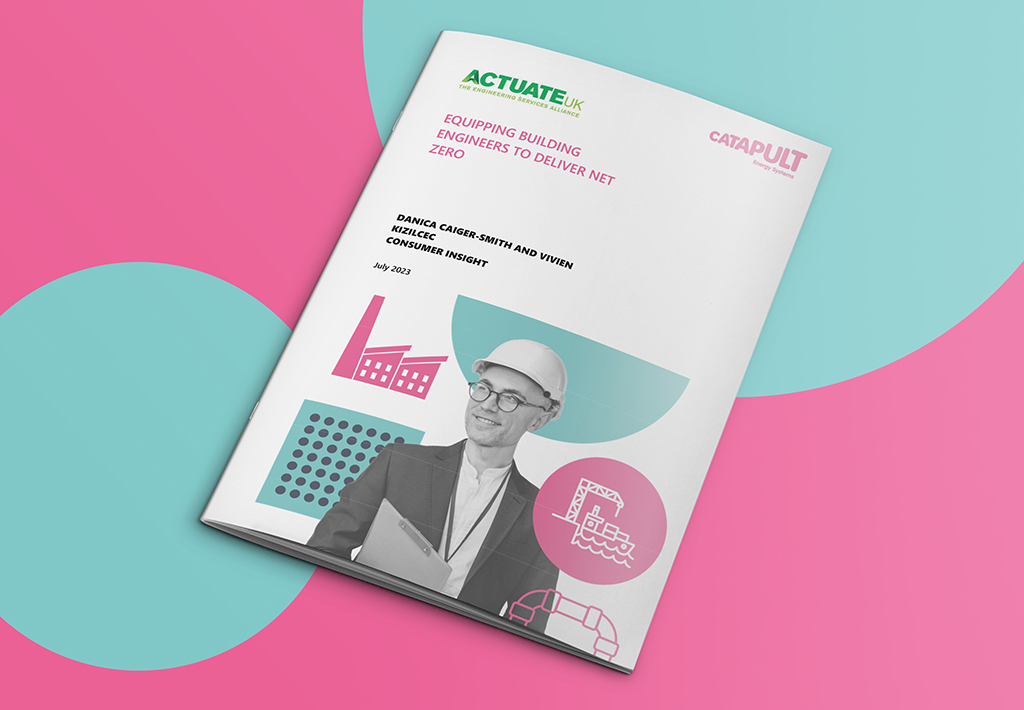New research reveals urgent need to tackle net zero skills challenge

The UK's Net Zero ambitions are currently hindered by an acute skills shortage that hampers the design, development, supply, installation, inspection, and maintenance of legacy, current, new, and innovative systems. This was the conclusion of Energy Systems Catapult’s (ESC) new report commissioned by Actuate UK, the engineering services alliance.
ESC interviewed and surveyed professionals from across the built environment sector to examine perspectives on net zero skills, the context for those and the opportunities that addressing them might represent.
Surveying industry professionals over the last year, the report reveals a worrying picture of skills shortages, lack of awareness and the need for a cultural shift. The report also examines the context and opportunities related to net zero skills issues and has suggested a comprehensive three-part framework to address these challenges: Awareness, Action, and Advantage.
Awareness
- Awareness of the need to decarbonise buildings is inconsistent and abstract. Clear definitions of what net zero buildings are, encompassing the full lifecycle of the building, will be central to setting the course for upskilling the sector.
- Partnerships that educate clients about net zero buildings and how to commission them could play a key role in supporting increasing demand and investment in quality.
- There is widespread awareness of an existing skills shortage. Without urgent action, an increasing need to deliver net zero buildings will only exacerbate this.
Action
- A framework of targeted activities, regulations, standards and processes will be needed to deliver net zero buildings. Industry needs to play a central role in defining, driving and delivering this, partnering with government where necessary to build a landscape which facilitates this.
- Trade organisations have a vital role in articulating the skills needs and tailoring these activities to specific sectors as well as government to help educate and drive the industry to deliver.
- Action should focus on easily accessible training that consistently delivers high-quality outcomes and on bringing new, diverse talent into the sector. Promoting upskilling, the integration of new skills and mobility of skills within and beyond the sector could help refresh and reset the culture within the industry.
Advantage
- Competing on the basis of quality will drive diversification - offering clients a far greater range of options that they currently have - and investment in skills and innovation.
- Businesses, organisations and individuals who demonstrate a lifelong appetite for learning and development will be in highest demand, driving a sector and culture that strives for continuous improvement and high quality.
Delivering net zero buildings is a technical challenge. But creating a sector which – at every level – understands that challenge, embraces it and takes ownership and responsibility for addressing it requires a profound culture shift. A shared understanding of the vision – at task, project and sector level – and productive, collaborative behaviours will be crucial to building and embedding the right technical skills in the most effective way.
Helen Yeulet, Director of Training and Skills of Building Engineering Services Association (BESA), who also leads the Actuate UK Skills Group, commented: “The report shows that we are at a tipping point for the industry’s skills capacity. There is a clear consensus that the industry needs to drive cultural change with Government providing supportive incentives.
We want to work with our partners in Actuate UK and beyond to define the industry’s skills needs and training solutions which will be ensure the industry can achieve readiness for delivering on our net zero targets.”
You can access the full report here and on the Energy Systems Catapult website: https://es.catapult.org.uk/report/equipping-building-engineers-to-deliver-net-zero/



.JPG)



